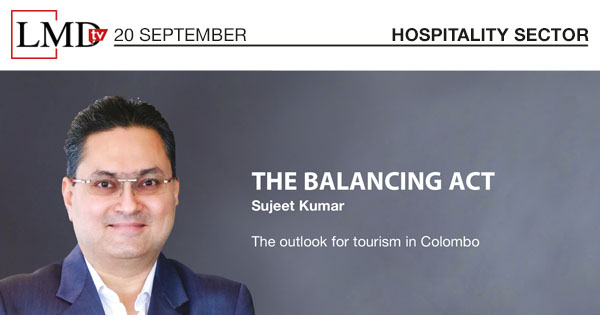
Hospitality in Sri Lanka has been hit with multiple challenges from the April 2019 Easter Sunday bombings to the pandemic and economic crisis.
However, the General Manager of ITC Ratnadipa – Colombo Sujeet Kumar remains optimistic. “The return to normalcy has been slower than what you’d expect but we’re certainly getting there,” he said on LMDtv, in late September.
He explained: “The country has been through tough times but the people are extremely resilient – they bounce back like they always have despite the challenges that they’ve faced. Tourist arrivals are increasing month on month, visitors are coming and restaurants are full, which gives us the confidence to say that we’re doing well.”
Sri Lanka is seeing many foreign hotel chains entering and setting up operations, and Kumar noted that Colombo, being the commercial capital, attracts the lion’s share of new business.
He attributed this to several factors: “Colombo has been on the map for quite some time and in top travel rankings including Lonely Planet’s – everyone sees its potential.”
“Colombo is a commercial hub but it has a lot more than merely business that people come for,” Kumar added, citing nightlife, casinos, shopping and other attractions.
And the commercial capital’s city tourism prospects will be enhanced with the fruition of recent discussions between India and Sri Lanka, on developing greater connectivity and strengthening bilateral relations.
“India has been the largest source market to Sri Lanka for some time, and any kind of development in infrastructure, connectivity and economic cooperation will bode well for both countries,” he declared.
Kumar elaborated: “Indians love to come to Sri Lanka for many reasons including the culture, food, nightlife, shopping, casinos, beautiful beaches and more. The city has so much to offer and there is a great value proposition where you get a lot more value for money – regardless of whether you’re paying in Indian Rupees.”
“This makes it an even more attractive destination to travel to for business or leisure,” he added. And Kumar noted how Colombo behaves differently from destinations in the south, the central region and the northeast to name a few.
He explained: “The dynamics are quite different.” Colombo attracts a more or less equal share of business travellers and corporates, and the MICE (meetings, incentives, conferences and exhibitions), lifestyle and destination weddings segments, he added.
And Kumar observed that “everybody promotes the destination, which is great – it’s exactly what we should be doing,” but added that it is necessary “not to forget to promote Colombo right.”
“We should talk about all the great things that we have including UNESCO World Heritage Sites and whatnot but you need to give people a reason to come here. Otherwise, the average length of stay of a visitor is two to three days in Colombo, which I believe does little justice because there’s a lot more that you can do,” he mused.
The General Manager of ITC Ratnadipa – Colombo emphasised the need for a prominent, focussed and targeted approach to promoting Colombo, which “talks about the good things and not only the Gangaramaya Temple, nightlife or casinos.”
Focussing on Colombo’s city tourism prospects, he stressed the importance of balancing the many aspects that make the destination the perfect hospitality package.
Kumar emphasised: “In city hotels, people expect great infrastructure – that’s a given. Good infrastructure leads to efficiency, which leads to a better quality of service and happy consumers.”
“It’s all tied together and always going to be a tightrope,” he said, adding that hotels shouldn’t trade efficiency for hospitality or friendliness for speed.
In summing up, Kumar stated: “Everything has to be balanced like the four legs of a table; you can’t give prominence to one over the other – it doesn’t work for guests or team members.”

